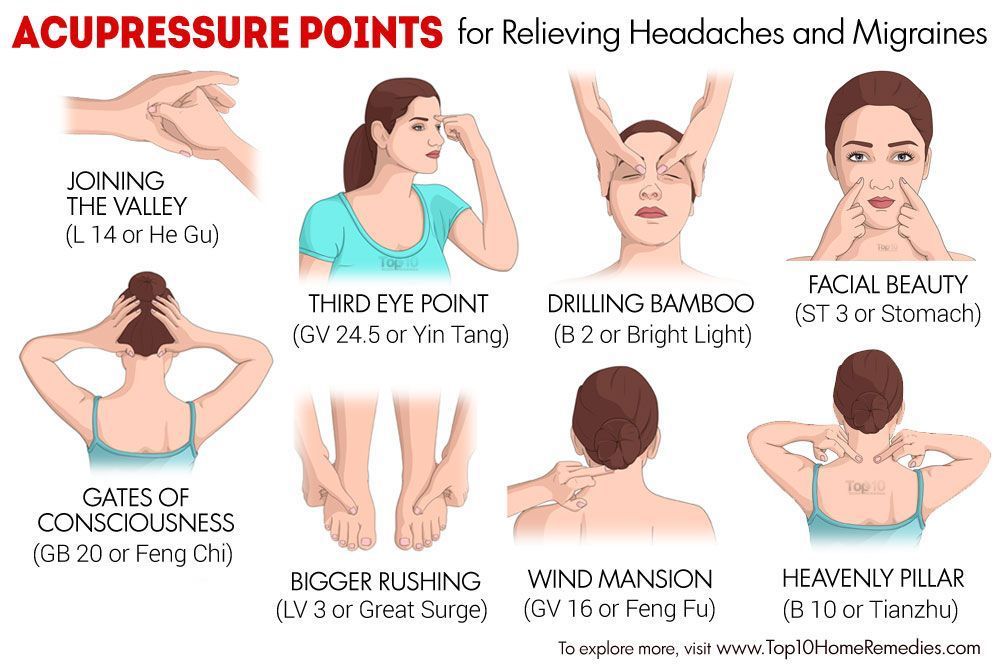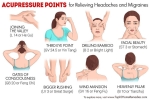
According to the American Headache Society, approximately 28 million Americans over the age of 12 experience migraines.
A migraine is more than just a bad headache. Throbbing pain in your head is a common symptom, but it’s not only one that people experience. Migraines can also involve:
- nausea
- vomiting
- diarrhea
- sensitivity to light
- sensitivity to sound
In some cases, you may even experience migraines with some of these symptoms but no head pain.
Migraines can be a debilitating, chronic health condition. In some cases, stimulating pressure points on your body may help provide relief. If you press on the point, it’s called acupressure. If you use a thin needle to stimulate the point, it’s called acupuncture.
Migraine Triggers
The exact cause of migraines is unknown, but both genetics and environmental factors seem to be involved. Imbalances in your brain chemicals may cause migraines. Changes in your brainstem and how it interacts with your trigeminal nerve may also play a part. Your trigeminal nerve is a major sensory pathway in your face.
Migraines may be triggered by a number of things, including:
- certain foods, such as aged cheeses, salty foods, processed foods, or foods containing aspartame or monosodium glutamate
- certain beverages, such as wine, other types of alcohol, or caffeinated drinks
- certain medications, such as birth control pills or vasodilators
- sensory stimuli, such as bright lights, loud sounds, or unusual smells
- changes in the weather or barometric pressure
- changes in your hormones during menstruation, pregnancy, or menopause
- too much sleep or a lack of sleep
- intense physical activity
- stress
According to the Mayo Clinic, women are three times more likely to experience migraines than men. Having a family history of migraines raises your risk of getting them.
Diagnosing a Migraine
There’s no one specific test to allow your doctor to diagnose a migraine accurately. Your doctor will ask you about your symptoms to diagnose you. They may also ask about your family's medical history.
Treating a Migraine
Your doctor will probably recommend lifestyle changes to help treat your migraines. They’ll likely encourage you to identify and avoid your migraine triggers, which vary from one person to another. Depending on your triggers, they may advise you to:
- change your diet
- switch medications
- avoid certain sensory stimuli
- adjust your sleep schedule
- take steps to manage your stress
There are also medications available to treat migraines. Your doctor may recommend pain-relieving medications to control your immediate symptoms. They may also prescribe preventive medications to reduce the frequency or length of your migraines. For example, they may prescribe antidepressants or anticonvulsants to adjust your brain chemistry or function.
Some alternative therapies may also provide relief. For example, acupressure, acupuncture, massage therapy, and some supplements may help prevent or treat migraines.
Stimulating Pressure Points for Migraine Relief
Stimulating different pressure points on your body using acupressure or acupuncture may help relieve your migraine symptoms.
One study published in the journal Neurological Sciences found that acupressure applied to a point on participants’ wrists relieved nausea during migraine attacks. This particular pressure point has been found to relieve other causes of nausea as well, such as nausea from chemotherapy and motion sickness.
Another study published in the American Journal of Chinese Medicine found that acupressure relieved chronic headache pain, which is sometimes caused by migraines. The pressure was applied to points on participants’ faces, heads, and necks.
Make an appointment with a licensed professional to use acupressure or acupuncture to relieve your migraine symptoms. You can also invest in a set of acupressure wristbands, such as Sea-Bands, to help relieve migraine-related nausea at home.
Precision Pain Care and Rehabilitation has two convenient locations in Richmond Hill – Queens and New Hyde Park – Long Island. Call the Richmond Hill office at (718) 215-1888, or (516) 419-4480 for Long Island office, to arrange an appointment with our Interventional Pain Management Specialist, Dr. Jeffrey Chacko.













